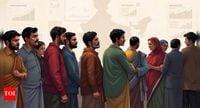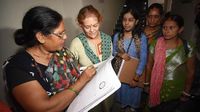In a landmark decision that has stirred political waters across India, the Union government announced on April 30, 2025, that caste enumeration will be included in the upcoming national census. This move, which marks a significant policy shift after decades of reluctance, comes as a response to increasing demands from various political parties and social groups advocating for a comprehensive understanding of caste dynamics in the country.
Union Minister Ashwini Vaishnaw, during a press briefing, stated that the Cabinet Committee on Political Affairs (CCPA) had resolved to incorporate caste enumeration into the census. This decision is particularly noteworthy as it breaks a long-standing tradition where caste data was not collected in national censuses since 2011, except for Scheduled Castes (SCs) and Scheduled Tribes (STs). Vaishnaw emphasized the need for a centralized approach to ensure uniformity and transparency in data collection, aiming to avoid the discrepancies often associated with state-level surveys.
The announcement has been met with mixed reactions from political leaders. Rahul Gandhi, leader of the Congress party and a staunch advocate for a caste census, claimed that the Modi government has adopted "our vision" regarding this issue. He expressed optimism that this decision validates the Congress's long-standing demand for caste enumeration, which Gandhi has championed for the past two years. "We welcome it… We have shown that we can pressure the BJP into doing a caste census," Gandhi stated during a press conference following the announcement.
Gandhi further highlighted the urgency of implementing the caste census effectively, referencing the successful caste survey conducted in Telangana as a potential model for the national exercise. He insisted that the government must provide a clear timeline for the census and allocate necessary funds to ensure its success.
Meanwhile, Union Home Minister Amit Shah framed the caste census as a commitment to social equality, asserting that it would empower all sections of society. He described the decision as a historic step towards addressing the social and economic disparities that persist in India.
Opposition leaders, particularly from the Rashtriya Janata Dal (RJD), have hailed the announcement as a victory for their decades-long demand for caste enumeration. Former Bihar Deputy Chief Minister Tejashwi Yadav noted that this was a significant achievement for his party, which has long advocated for a caste census to ensure adequate representation of marginalized communities in governance. Yadav pointed out that the recent caste survey conducted in Bihar revealed that OBCs and Extremely Backward Classes constitute over 63% of the state's population, underscoring the necessity for accurate caste data in policy-making.
However, the BJP has also used this opportunity to criticize the Congress party, accusing it of previously opposing caste enumeration. Vaishnaw pointed out that Congress governments had historically refrained from conducting a caste census, labeling their past efforts as politically motivated. He stated, "Congress governments have always opposed the caste census," referencing a statement made by former Prime Minister Manmohan Singh in 2010, which called for consideration of caste enumeration in the Cabinet.
The historical context of caste enumeration in India dates back to the British colonial era when caste data was systematically collected from 1881 to 1931. However, after independence, the practice was discontinued, with the first census of independent India in 1951 opting not to include caste data beyond SCs and STs. The absence of updated caste figures has made it challenging to implement policies aimed at uplifting marginalized communities, particularly following the recommendations of the Mandal Commission in 1980, which advocated for OBC reservations.
Activists and experts have long argued that a caste census is crucial for understanding the socio-economic landscape of India, enabling targeted policies to address inequalities. Poonam Muttreja, executive director of the Population Foundation of India, emphasized that access to essential services like education and healthcare is often shaped by structural inequalities of caste. "A caste census is critical to uncover these intersectional disparities and to design policies and programs that are truly equitable and inclusive," she stated.
The decision to include caste enumeration in the upcoming census is poised to have significant implications for governance and electoral politics in India. As various parties gear up for the next elections, the availability of accurate caste data could reshape strategies and influence policy-making, particularly in terms of reservations and welfare schemes.
Despite the enthusiasm surrounding the announcement, details regarding the methodology for data collection and categorization remain unclear. The government has yet to provide a specific timeline for when the census will commence, leaving many questions unanswered.
In the meantime, the political landscape is heating up, with parties positioning themselves to capitalize on this pivotal moment. The Congress party, having long championed the cause of a caste census, is likely to use this development to rally support ahead of the elections. Meanwhile, the BJP's framing of the issue as a commitment to social equity may resonate with voters concerned about caste-based disparities.
As India prepares for this significant step towards understanding its demographic complexities, the caste census could serve as a critical tool for shaping the future of social justice and equality in the country. The coming months will reveal how effectively the government can navigate this politically sensitive issue and implement a census that reflects the diverse tapestry of Indian society.





